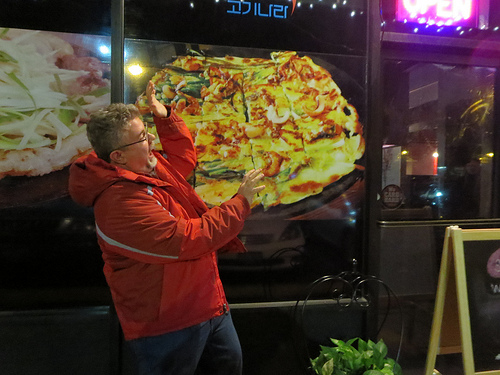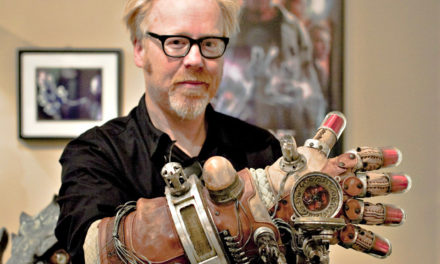Recently I wrote about a food podcast. And my naivete in that specific realm of podcasting has gotten me in a little bit of trouble. In that post, I referred to The Feed Podcast as being the first of its kind. Man, was I wrong. Not only are there other food podcasts out there, there’s a kick-ass operation right around the corner in Chicago.
Michael Gebert is a James Beard Award-winning, multimedia food journalist. He was the editor of New York Magazine‘s “Grub Street Chicago.” And he’s the creator of Sky Full of Bacon, a nationally acclaimed video podcast and blog, which spawned an audio incarnation, Airwaves Full of Bacon. Mike reached out to me last week to talk about the show.
Tell me about Sky Full of Bacon:
Sky Full of Bacon is devoted to the food scene in Chicago and the Midwest generally. I’ve written about and covered the food scene here for almost a decade, one way or another, because it’s a great subject (and one I’m personally fond of!), with everything from creative high-end chefs to rich ethnic food cultures. So this was basically me playing with my favorite subject, food, in an audio format this time.
How does one convey the sensations associated with good food in a podcast?
Well, you talk to interesting people. You take people inside certain kinds of places and give them that you-are-there feeling. So for instance, I recorded being in the kitchen of Next, which is the hottest restaurant in Chicago, during service—the sounds of the kitchen, the chefs, the expediter calling dishes out.
I interview chefs about their job and how they do what they do. I talk to authors about their books. And I shoot the shit with other food journalists. I mean, we’re all trying the new places, we know all the same dirt, so it’s fun to have a place to kick it around, sort of like we do in real life when we meet up.
Why podcasting?
For several years I’ve been doing videos, mini-documentaries about food culture in one way or another–South Side Chicago African-American barbecue, or organic farmers, or butchers and how they feel about meat, subjects like that. They tended to be long and thoughtful pieces, Sunday New York Times magazines pieces in video form.
And I’ve always had this theory that, you change the format or the medium and you get something new out of the same person, a new voice. So I thought about switching from video documentaries, which take a long time to do, to a timelier kind of thing, which would be more devoted to the immediacy of the food scene. (That’s not to say I don’t still make films, but this was something new to play with.)
Here I was, recording interviews with chefs just so I wouldn’t have to transcribe them on the fly. And you know, when you record an interview for print, there’s always stuff that you don’t use. Sometimes you talk to someone for half an hour and only use 200 words. Or there’s the digression in the middle of a conversation that just doesn’t fit a straight-line narrative. So there’s always extra stuff, and this was a way to use that, like the extra scenes on a DVD.
To some extent, it’s very inside baseball on the food scene, and I know it’s not going to have a zillion listeners, but there are at least a few thousand people who want to geek out on Chicago food and chefs that way, so it’s fun to be the one giving it to them.
What distinguishes Airwaves of Full of Bacon from other Food Podcasts?
I’m not doing radio. I’m doing audio. It’s not a radio show, following the conventions of commercial radio. I don’t banter with a co-host, I don’t have audience participation segments. I try to have no more of me in it than is necessary to make it flow, frankly. Nothing wrong with that, but it’s not what I do.
Mine is audio. Each piece, even a fairly straightforward interview, is a self-contained audio piece of its own. The most elaborate ones are little audio movies that are about creating the feel of a particular place, like the one about country hams in Kentucky. I wanted you to feel like you were in a room floor to ceiling with funky country hams covered in mold. I wanted you to smell it through your iPod.
Audio is fun because its limitations are so obvious that you have to think about how you get past them and bring something to life in the limited ways you have to play with. It’s the storefront theater with black walls and no sets of journalism.
###
Follow Michael Gebert @skyfullofbacon





